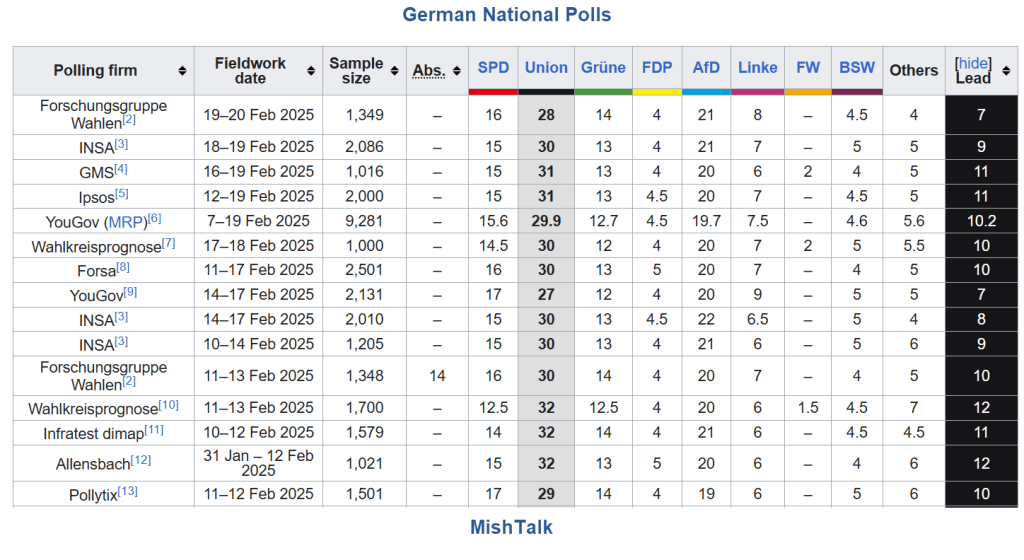Here’s a final look at German polls that shows no coalition can logically work.

The lead chart and text below is from Wikipedia Opinion polling for the 2025 German federal election
Electoral threshold of 5 Percent
In the runup to the 2025 snap election, four of the eight main parties represented in the Bundestag were at risk of failing to pass the 5% electoral threshold, thus placing the actual outcome in significant uncertainty. The Social Democratic Party (SPD) led by Chancellor Olaf Scholz, the Christian Democratic Union (CDU) led by challenger Friedrich Merz, the Alternative for Germany (AfD) led by challenger Alice Weidel, and the Alliance 90/The Greens led by candidate Robert Habeck are all expected to obtain a voting volume that is significantly higher than the qualifying 5% threshold.
Seats in the Bundestag are allocated to party lists that either pass the “five percent hurdle” of federally valid second votes, or win at least three constituencies. In the 2021 German federal election, this granted Die Linke (The Left) full proportional representation as it won three constituencies despite receiving 4.9% of second-ballot votes. In 2022, this three-constituency rule was abolished, but was reinstated by the Federal Constitutional Court.
Union means CDU/CSU. The most recent poll has CDU/CSU at 28 percent.
If parties crash out delegates are proportionally allocated to the remaining parties.
I commented on possible coalitions on February 14, in German Elections Feb 23 – Only One Coalition Makes Sense (But No One Wants It)
All of the other parties have ruled out working with AfD. But no other coalition makes any sense. Disaster looms.
CDU leader Friedrich Merz told party delegates that he would not enter into any form of cooperation with the far right, which he described as his party’s main adversary. The CDU, he said, could not work with a party that wants to leave NATO, the euro and the European Union.
What Coalitions Make Any Sense?
There is only one CDU/CSU + AfD.
Granted they differ on NATO, the euro, and the European Union but they agree on immigration, business policy, and getting rid of Green nonsense.
A CDU/CSU + Green coalition is mathematically possible if all the bubble parties crash out. That would make a majority mathematically possible but idiotic. The only things the coalition would totally agree on is the Euro.
A CDU/CSU + SPD “Grand” coalition is also mathematically possible if all the bubble parties crash out. But we have had three failed Grand coalitions already. The two party heads are fighting.
If Die Linke (far Left) and BSW (also far Left) survive, it would be hard to make any math work, especially if CDU/CSU gets under 30 percent.
What to Expect?
Since no coalition makes any sense but the one CDU/CSU rejects, expect months of bickering followed by the formation of a dysfunctional and unstable coalition.
The only other possibility is CDU leader Friedrich Merz breaks his pledge and forms a coalition with AfD. I rate that a 5 percent chance.
What About Trump?
Germany can expect a nightmare. This one is 100 percent.
Trump wants defense spending at 5 percent of GDP when Germany does not even spend 2 percent.
Germany has one of the worst infrastructures in the EU (internet, fiber lines, phones, and trains). And as discussed above, Germany is deindustrializing having over-relied on diesel and analog phones while avoiding AI and EVs.
Finally, Germany has a trade surplus with the US of $85 billion that Trump vows to flatten with tariffs.
Germany is in piss poor economic and political shape.
In essence, nothing has changed from February 14 other than support for Die Linke and AfD up slightly and CDU/CSU down slightly, assuming the polls are accurate.
Generally, German polls are at least in the ballpark.
Related Posts
January 9, 2025: Trump Demands Defense Spending 5 Percent of Europe GDP, No Chance of That
Much of the EU is struggling to get defense spending up to 2 percent of GDP. 5 percent of GDP has zero chance. Let’s discuss the math.
February 13, 2025: Trump Fails to Pull the Trigger on Reciprocal Tariffs, Will Study the Issue
Q: What’s Going on in the EU?
A: We have a trade deficit with Ireland of $87 billion. And we have a trade deficit with Germany of $85 billion. That is $172 billion of the $203 billion deficit with the EU.
Germany is in trouble even if CDU/CSU manages to scrape up another “Grand Coalition”
On February 16, I commented Vance Shocks Europe by Supporting AfD and Blasting EU’s Lack of Free Speech
Vice President J.D. Vance took off the gloves in Europe. Many European leaders are shocked. Good!
German political leaders accused Vance of interfering in their election. It will be interesting to see what, if any, impact that had.